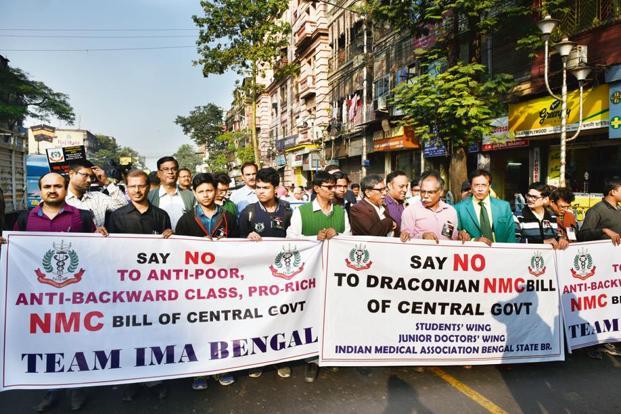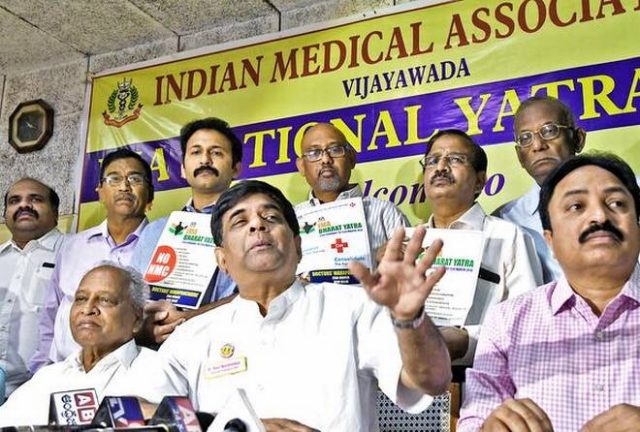The National Medical Commission Bill 2017 which was introduced in the Lok Sabha on 29th December 2017 has been the subject of criticism for quite some time now. Major medical associations from all across the country including the Indian Medical Association (IMA) have resorted to widespread protests.
In fact, the IMA has called this Bill an anti-poor, anti-people, non-representative, undemocratic and anti-federal in nature.

But why do medical professionals have a problem with the Bill which seeks to replace the extremely old and corrupt Medical Council Of India (MCI) which has grown to be merely a small clique of self-interested people?
And why should the country’s youth especially the aspiring doctors be worried if this Bill becomes a law?
Let us see.

Let us analyze the problems related to some of the key features of the Bill:
#1. A Completely Bureaucratic Structure of the NMC
The present MCI has members who are not only nominated by the Central government but also has members with proper medical qualifications elected by the various universities and registered medical practitioners, which ensures proper representation from major stakeholders.
However, the proposed National Medical Commission will be an entirely nominated body. It would have 25 members selected by a search committee appointed by the Central govt. and would be headed by a Union Cabinet secretary.
This type of a structure not only has a lack of representation from certified medical practitioners and university deans but is a completely bureaucratic structure which will hamper the autonomy of the body with over-dominance from the government.
This means that if there is to be a change in the syllabus of the undergraduate medical course, it would be taken forward by people who have zero knowledge about the field.
And this in fact would affect the quality of medical education imparted to the aspiring doctors all over the country.
Also Read: Is It Okay For Politicians To Use Unfair Means To Achieve Greater Good? Lord Krishna Says Yes
#2. Making Medical Education More Expensive
According to some sources, out of the 479 medical colleges in India only 273 are run by the government indicating that medical education in India has already shifted from public to private domain.
To make matters worse, the National Medical Commission Bill allows the administration of medical colleges to charge any amount of fees for 60% of the seats.
It wouldn’t take a layman one second to understand that the government is actually giving a green flag to the colleges to charge exorbitant fees from medical aspirants. Not to mention this explicitly supports the dominance of medical education by the rich and openly allows corrupt practices to take place.
What about the poor students who would not be able to pay such high fees? Don’t they deserve to receive good quality education?
#3. Provisions on the NEET Exam
The NMC Bill provides provision for a common National Eligibility cum Entrance Test (NEET) for admissions to undergraduate medical education in all medical colleges in India with an aim to ensure that “merit” is the only criteria for admissions.
However a point here that is very well ignored is that by doing this, it will dismantle the efficient state medical boards and create an environment where only those students will be favored who have access to costly medical coaching centers needed to crack NEET i.e. the urban social elite.
Private coaching institutes is already a booming business in India and this move will only encourage them further and narrow down the profession to only a few rich individuals. Poor students who can’t afford private tuitions will be totally out of the scene.
Another major cause for concern is that the NMC Bill also allows the medical institutes to increase the number of seats and introduce PG courses without even seeking permission or giving evidence of having the adequate infrastructure and manpower to handle that. This poses a chance for the quality of medical education to degrade even further.
#4. Steps to Empower AYUSH Practitioners
India has a huge shortage of doctors to cater to the need of primary health care for communities especially in the rural regions where not many medical professionals are eager to go.
And what does this Bill do to close this gap?
It intends to offer “bridge courses” which would legalize AYUSH practitioners to prescribe allopathic medicines. Bridge courses are basically supplementary short term courses to prepare students for next higher level of learning.
This provision will not only put the credibility of all domains of medicine in danger but also be a way to mix homeopathy and allopathy which might prove dangerous for the patients.
All in all, I feel that although there is a need to do away with the corrupt MCI and make way for newer reforms to regulate medical education and practice in India, the National Medical Commission Bill is in no way going to achieve this. There are huge loopholes which need to be addressed before making it a law.
Images Sources: The Hindu, Indian Express
Sources: The Hindu, LiveMint, Economic & Political Weekly, Indian Express
Other Recommendations For You:
http://edtimes.in/2018/03/the-lsr-girls-story-of-a-semen-filled-balloon-doesnt-add-up-lets-see-why/































This is an article by vested interest groups. In every modern country the doctors are answerable why not in India. I have seen in US doctors work their asses off still smile politely to every patient. This has become possible because they are answerable and might loose their license any time. MCI became a joke over the years. Country lost billion of dollars of revenue due to lack of professionals. Oversupplying the market with millions of doctors is the key. Overcrowding the city will force some doctors to go to rural areas to make a living. We can’t even produce the quantity, forget about quality. I support NMC bill. Niti aayog and experts has given due thought in preparing the bill.
I urge citizens not to fall prey in this type of propaganda. MNC bill will change the face of medical system in the country. In few years we could even earn billions of dollars by providing cheap by quality medical treatment to the entire world (like we do in software). It will be cheap if we produce doctors more in quantity, it would be quality service if there is common standard exit exam and strict monitoring with a fear of license cancellation.
Author is totally in interest of IMA by ignoring the +ve facts of NMC ….It will increase the ration of doctor patient in India .;It will also increase number of doctors by banning FMGE for foreign doctors as FMGE is injustice to FMG and they too will give NLE